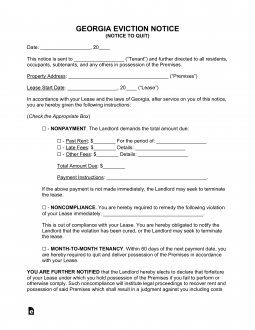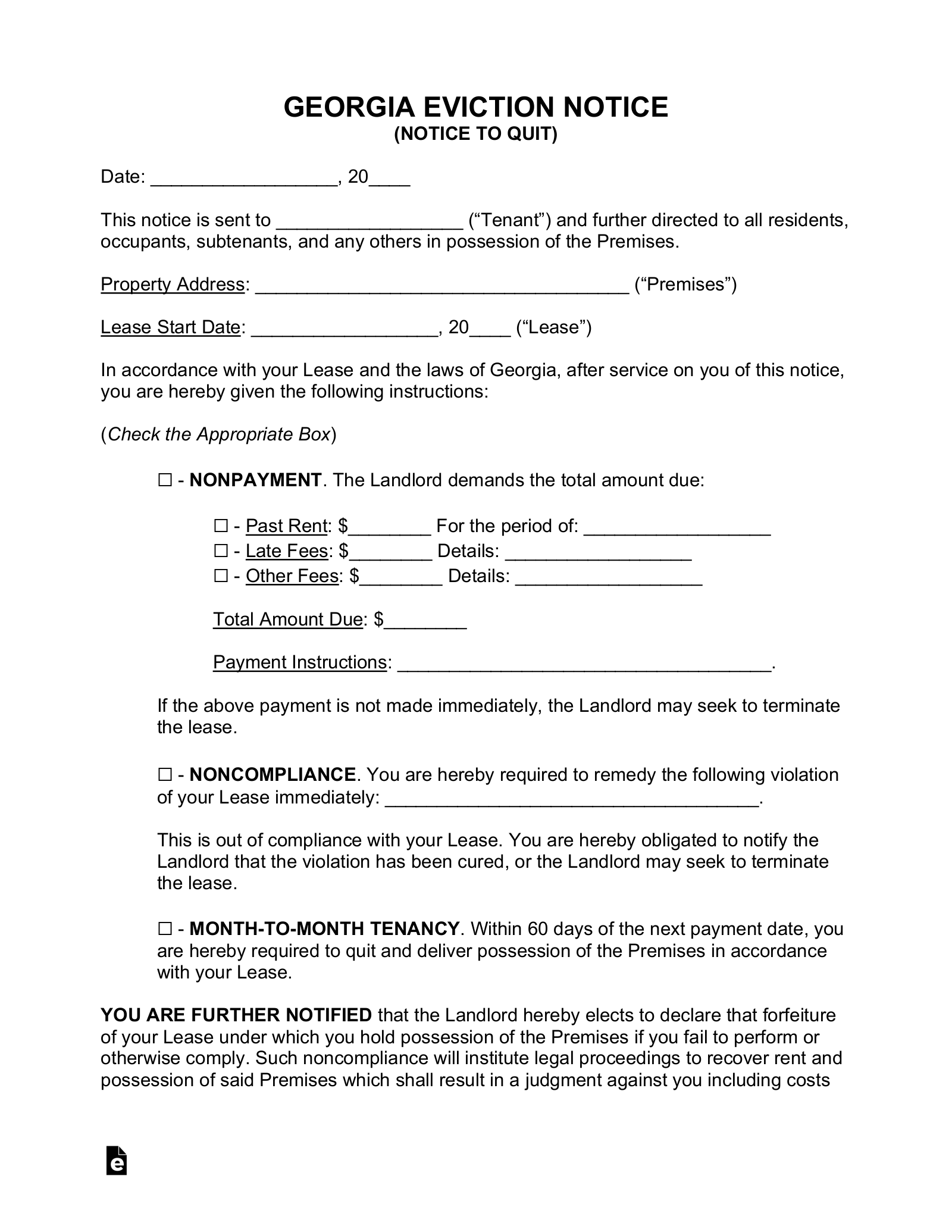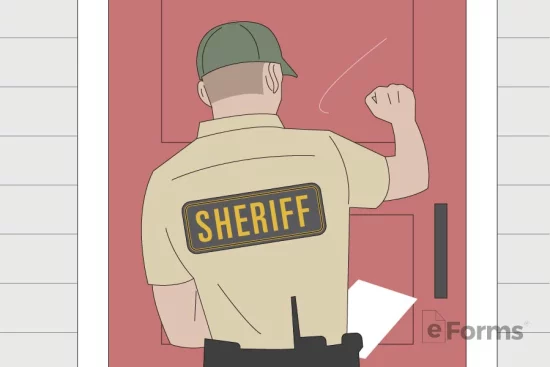Updated February 26, 2024
A Georgia eviction notice is a letter given by landlords to tenants when the terms of the lease have been broken. The landlord will give notice describing the violation and how long the tenant has to fix the issue. If the tenant fails to cure the violation, they will be asked to vacate the property, and an eviction lawsuit (“dispossessory action”) can be filed in the local court by the landlord.
By Type (3)
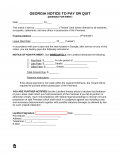 Immediate Notice to Quit (Non-Payment) – Use to ask your tenant to leave after the tenant has breached the lease and you have followed the terms of the lease with regard to termination and notice requirements. Immediate Notice to Quit (Non-Payment) – Use to ask your tenant to leave after the tenant has breached the lease and you have followed the terms of the lease with regard to termination and notice requirements.
Download: PDF, MS Word, OpenDocument |
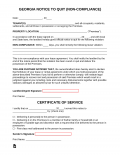 Immediate Notice to Quit (Non-Compliance) – To request the tenant fix a lease violation for any reason other than late rent. Immediate Notice to Quit (Non-Compliance) – To request the tenant fix a lease violation for any reason other than late rent.
Download: PDF, MS Word, OpenDocument |
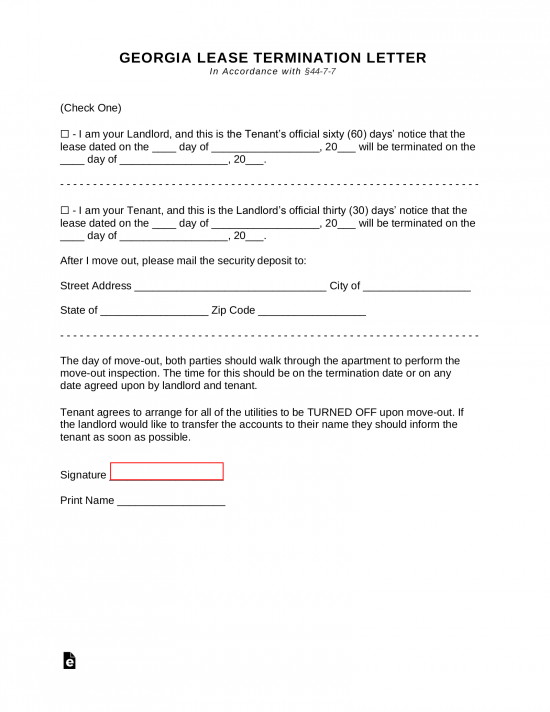 60/30 Day Notice (Month-to-Month Tenancy) – Use to give your tenant notice that you do not intend to renew the lease at the end of the term. The landlord is required to give at least 60 days’ notice while the tenant must give at least 30 days’ notice to the landlord. 60/30 Day Notice (Month-to-Month Tenancy) – Use to give your tenant notice that you do not intend to renew the lease at the end of the term. The landlord is required to give at least 60 days’ notice while the tenant must give at least 30 days’ notice to the landlord.
Download: PDF, MS Word, OpenDocument |
Table of Contents |
Prohibited Landlord Actions
Utility Shutoff – It is unlawful for a landlord to willfully suspend a tenant’s utility services until the eviction has been approved by the court. Any landlord who violates this law can be fined up to $5,000.[4]
Changing the Locks – The landlord is legally prohibited from evicting a tenant without going through dispossessory proceedings. That includes changing the locks without a court order.
Court Forms
Dispossessory Affidavit – This document is served on the tenant should they fail to comply with the Notice to Quit. It indicates that the landlord has filed with the court and that there is a lawsuit against the tenant.
Answer Form – The tenant may reply to the Dispossessory Warrant with an Answer Form defending their claim to stay on the premises. The GA Magistrate Council has not published a statewide form, but several counties have their own standardized versions. See, e.g., Fulton County Answer Form.
Writ of Possession – Should the judgment be in favor of the landlord, a Writ of Possession will be completed and delivered to the Sheriff requiring them to remove the tenant on the day indicated in the document.
How to Evict (4 steps)
- Provide Eviction Notice to Tenant
- File Dispossessory Affidavit
- Serve Dispossessory Warrant to Tenant
- Obtain Writ of Possession
1. Provide Eviction Notice to Tenant
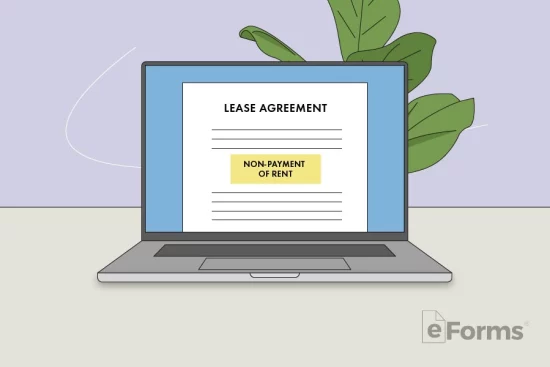
Make sure you have read your lease carefully and abide by the notice and termination terms set forth therein. You will then either provide the tenant with an Immediate Day Notice of Quit (Non-Payment) or a Month-to-Month Notice to Quit.
2. File Dispossessory Affidavit
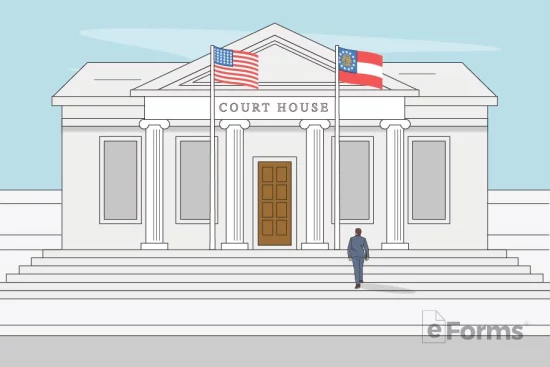
If the tenant fails to respond to the notice, you are then entitled to file a dispossessory action in your Local Magistrate Court. The courts have the form you need to file – you must use the Dispossessory Affidavit. You will need to have your tenant’s name and address, the reason that you are seeking dispossession, and you will need to certify that you provided notice to your tenant to vacate the premises.
Filing fees vary by county. For example:
4. Obtain Writ of Possession
The tenant will have seven days to respond with an Answer Form (tenant may use the Online Form Service to fill out). If the tenant does not respond, the landlord may obtain a Writ of Possession from the court to take back possession of the premises. Again, you will need to obtain from your local court. Once the landlord has a Writ of Possession signed by the court, he or she can have the sheriff remove the tenant.
Sources
- Ga. Code § 44-7-50(a)
- Ga. Code § 44-7-7
- Ga. Code Title 44, Chapter 7, Article 3
- Ga. Code § 44-7-14.1
- Fulton County Magistrate Court – Filing Fees
- Gwinnett County Magistrate Court – Fees
- Eastern Judicial Circuit of Georgia – Magistrate Court Fees
- Clayton County – Eviction
- Paulding County – Magistrate Court Filing Fees

